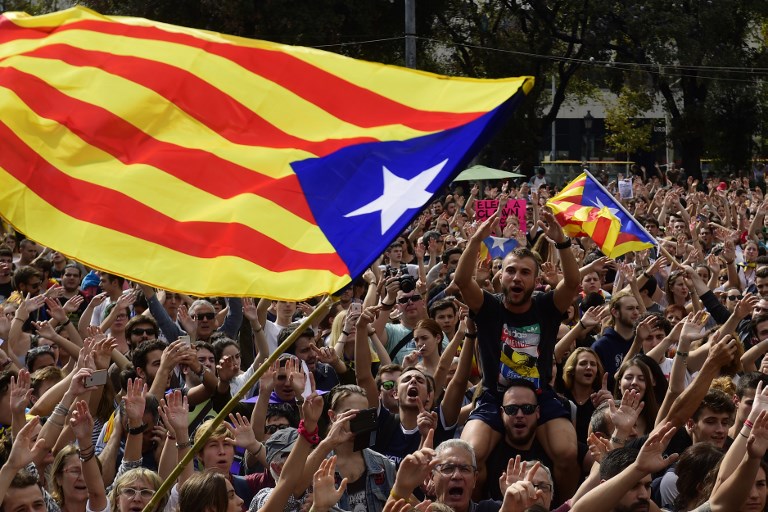
by Danny Kemp and Damon Wake
Agence France Presse
Brussels, Belgium (AFP) — EU leaders on Monday called for dialogue to solve the crisis over Catalonia’s banned independence referendum and urged an end to violence in a cautious first reaction to a thorny subject for the bloc.
Breaking weeks of virtual silence on the subject after scores were hurt in clashes in Catalonia, the European Commission said the referendum was “not legal” under Spanish law and was an “internal matter” for Madrid.
France’s President Emmanuel Macron voiced his support for Spain’s “constitutional unity” during a call with Prime Minister Mariano Rajoy, his office said on Monday in a statement which did not mention the weekend violence.
An independent Catalonia would not be part of the EU if it did vote for independence in a legal referendum, European Commission spokesman Margaritis Schinas said, and would have to apply if it wanted to join.
“The commission believes that these are times for unity and stability, not divisiveness and fragmentation,” Schinas said in a statement to reporters in Brussels.
“We call on all relevant players to now move very swiftly from confrontation to dialogue. Violence can never be an instrument in politics,” he said.
Schinas said Brussels trusted in the “leadership of Prime Minister Mariano Rajoy to manage this difficult process”.
He would not elaborate when asked repeatedly whether the European Commission condemned the violence that resulted from a police crackdown on the ballot.
Schinas also said the European Commission would not become involved in mediating the problem, despite a call for international mediation by the Catalan leader.
At least 92 people were confirmed injured out of a total of 844 who needed medical attention, Catalan authorities said.
Amadeu Altafaj, the Catalan government’s representative in Brussels, said it was “disappointing” that the commission spoke about
violence generally, without specifying who was responsible.
EU President Donald Tusk said on Twitter that he had used a call with Rajoy to appeal for “finding ways to avoid further escalation and use of force.”
And the European Parliament has called an urgent debate on the Catalan crisis for Wednesday, the head of the assembly said.
‘Not legal’
In the weeks leading up to the vote, the European Commission steadfastly refused to comment in detail on what it called an internal matter.
From Paris to Bratislava, EU members echoed the same phrasing as they publicly closed ranks behind Madrid, though in private some diplomats voiced concern at Madrid’s hardline handling of the crisis.
Regional separatist movements are a sensitive topic for a number of EU members, including Romania, Greece, Belgium and Britain.
Echoing Macron’s backing for Madrid, Romania’s foreign ministry reiterated its support for Spain’s “territorial integrity” and said the “incidents” Sunday were caused by “failure to respect Spain’s constitutional order” — putting the blame on the separatists’ side.
The images of violence from the weekend have brought a more vocal reaction from leading figures in the European Parliament, who are freer to speak their mind on the issue.
Gianni Pittella, head of the leftwing bloc in the parliament, lamented a “sad day for Spain and for the whole of Europe”.
“The solution can only be a political response, not a police one,” he said, criticising Rajoy for not doing more to defuse the crisis earlier.
Former Belgian prime minister and liberal MEP Guy Verhofstadt — parliament’s Brexit negotiator — condemned both the holding of an illegal vote and Madrid’s use of “disproportionate violence” to stop it, urging “de-escalation” and a negotiated solution.
Damaging images
Hendrik Vos, a professor of European politics at Belgium’s Ghent University, said that given the EU’s experience in managing international crises — such as the Iran nuclear deal — it would appear “strange” if it did not take a role in mediating between Madrid and Catalonia.
But Vincent Laborderie of the Catholic University of Louvain in Belgium said it was difficult to see how the EU could act as mediator.
“Very simply, the EU is not really an external actor, because Spain is a member state,” he told AFP, speaking last week before the vote.
He also said Madrid’s handling of the crisis was damaging its image abroad, while the Catalan separatists were “scoring points” in the media.
© Agence France-Presse








